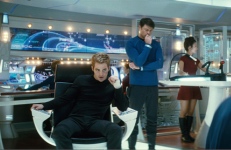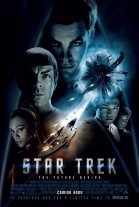Star Trek
|  J.J. Abrams’s ambitious reinvention of the more than 40-year-old science fiction flagship Star Trek, which hasn’t boldly gone across a silver screen since 2002’s dark and poorly received Star Trek: Nemesis, works in just about every way you could hope. Against the odds, Abrams and the screenwriting team of Roberto Orci and Alex Kurtzman have successfully crafted a new beginning that both honors the series’ previous incarnations but also charts its own course using a clever time-traveling narrative that essentially creates an alternate Trek universe and frees up future writers from having to adhere to every detail of the established canon. While Trekkies lap up all the pointed references to the television series and previous movies (from the Kobayashi Maru simulation, to the name of the captain in the original pilot episode), those who don’t know a Romulan from a Klingon will find much to enjoy in the slam-bang slickness of the thrills and the relatable emotional conflicts that form the story’s core. J.J. Abrams’s ambitious reinvention of the more than 40-year-old science fiction flagship Star Trek, which hasn’t boldly gone across a silver screen since 2002’s dark and poorly received Star Trek: Nemesis, works in just about every way you could hope. Against the odds, Abrams and the screenwriting team of Roberto Orci and Alex Kurtzman have successfully crafted a new beginning that both honors the series’ previous incarnations but also charts its own course using a clever time-traveling narrative that essentially creates an alternate Trek universe and frees up future writers from having to adhere to every detail of the established canon. While Trekkies lap up all the pointed references to the television series and previous movies (from the Kobayashi Maru simulation, to the name of the captain in the original pilot episode), those who don’t know a Romulan from a Klingon will find much to enjoy in the slam-bang slickness of the thrills and the relatable emotional conflicts that form the story’s core.Bringing Gene Roddenberry’s visionary series back to life after many had written it off as destined for the pop-culture dustbin is not exactly a new trick. Robert Wise did it in 1979 with Star Trek: The Motion Picture, which reworked the small-scale, low-budget aesthetics of the long-cancelled ’60s television series into something grandiose and elegant (and slightly boring), which then kicked off nearly three decades worth of new Trek adventures, including nine more movies and a handful of new television shows. The question becomes, how to reinvent it yet again for a new generation of both Trek fanatics and kids who only know of William Shatner as that puffy guy on the Priceline commercials? Abrams’s answer is to go back to the beginning: Reintroduce the characters of the original series and follow the paths by which they all wind up together on the bridge of the Starship Enterprise. The film begins with the birth of the venerable James Tiberius Kirk during a deep-space battle between a Federation ship commanded by his brave father (Chris Hemsworth) and a massive Romulan vessel from the future that is piloted by the vengeful Captain Nero (Eric Bana). We then see Kirk as a rebellious child in Iowa who grows up to be a rebellious young man (now played by Chris Pine) who enrolls in Starfleet Academy at the behest of Captain Christopher Pike (Bruce Greenwood), who knew Kirk’s father and recognizes in the son great potential that is currently going to waste. Kirk is also lured by his attraction to the Uhura (Zoë Saldana), a communications officer-in-training who ends up having a surprising and completely unexpected attraction of her own. Meanwhile, we are introduced to the young Spock, who is half-human and half-Vulcan, an element that has always been important to the series, but here becomes a genuine cornerstone, giving the character an emotional depth and sense of conflict that we haven’t always seen. As embodied as a young man by Zachary Quinto (whose physical similarity to Leonard Nimoy, the original Spock, is uncanny), the character has a great deal more repressed anger and resentment than is usually assumed, which we see most clearly when he essentially rejects his Vulcan culture to work at the Starfleet Academy. Moreso than ever, it is clear that Spock has an ego, that most telling of human qualities. The crux of the plot involves the young crew taking out the newly built U.S.S. Enterprise and battling Captain Nero, whose plan is nothing less than destroying the Federation by blowing up all Federation planets (starting with Vulcan), which he accomplishes by drilling a hole to the planet’s core and dropping in “red matter” that causes the planet to collapse into a black hole. For those who know the original show and subsequent movies well, there is real pleasure in watching younger incarnations of familiar characters finding their roles and also slipping into what will become well-worn patterns of interaction. Karl Urban’s Dr. Leonard “Bones” McCoy is as gruff and irascible as ever, although the film has fun with the idea that he first likes Spock before realizing that Spock’s insistence on logic is completely counter to his highly emotional humanism. As Sulu, John Cho is given an exhilarating action scene, something that George Takei rarely enjoyed, and Anton Yelchin plays the young Pavel Chekov as a teenager well ahead of his years, whose main flaw is his inability to pronounce the letter V. The last piece of the puzzle comes together with the addition of Scotty, who is given a deliciously comic edge by Shaun of the Dead’s Simon Pegg. Each of these actors plays off the familiar mannerisms of the original cast while also making the characters their own, with the most delicious being Chris Pine’s subtly becoming more Shatner-like as he moves closer to being in command of the Enterprise. If this new-fangled Star Trek has a flaw, it is that the necessity of tracing the origins of all the characters forces the film into what is essentially a feature-length set-up for future installments. Abrams and company clearly want to stay true to Roddenberry’s liberal optimistic vision of the original television show, but they are so busy putting all the pieces in order that there is little time for a narrative that is more philosophical or compelling than standard-issue action/adventure; it is a true warhorse, indeed. The best episodes of the original television show hinged on issues that were less about the future than about the Cold War-obsessed, socially conflicted here and now. There is little of that to be found in this reboot, mainly because the filmmakers are too busy plotting the characters and making the most of their vast arsenal of digital effects. To be fair, it is probably best to view Star Trek as a character-driven narrative, particularly in the way it traces the development of the central relationship between Kirk and Spock, two men of such opposite polarities that it was a given they would hate each before becoming best friends. That work having now been accomplished, the universe is basically wide open for the inevitable follow-ups, which should live long and prosper. Copyright ©2009 James Kendrick Thoughts? E-mail James Kendrick All images copyright © Paramount Pictures |
Overall Rating: 


 (3.5)
(3.5)


